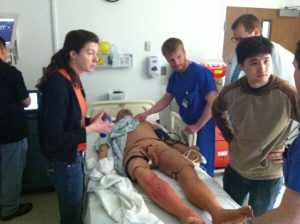Archive for August, 2018
Multistate Outbreak of Cyclospora Illnesses Likely Linked to Salads from McDonald’s
Thursday, August 2nd, 2018The FDA confirms the presence of Cyclospora in Fresh Express salad mix through new laboratory method; Fresh Express recalls expired products containing romaine lettuce.
July 31, 2018 Update
The FDA has confirmed the presence of Cyclospora in an expired salad mix, containing romaine lettuce and carrots, that was produced by the processor Fresh Express in Streamwood, Illinois.

On July 26, 2018, the FDA completed final analysis of an unused package of Fresh Express salad mix containing romaine lettuce and carrots, which had been distributed to McDonald’s. The analysis confirmed the presence of Cyclospora in that sample, though the expiration date for that product, July 19, had already passed. On July 27, the FDA informed Fresh Express of the results, and instructed Fresh Express to determine whether potentially contaminated product may still be on the market.
Fresh Express reported to FDA that the romaine from the same lot as the positive sample was not packaged for direct retail sale by Fresh Express and had already expired. Fresh Express committed to using recall procedures to inform companies that received additional products of concern about the sample result. Fresh Express also reported that the carrots in the sampled salad mix only went to McDonald’s.
On July 30, 2018, the U.S. Department of Agriculture’s Food Safety and Inspection Service (FSIS) issued a public health alert on beef, pork and poultry salad and wrap products potentially contaminated with Cyclospora that was distributed by Caito Foods LLC, of Indianapolis, Ind. The products were produced between July 15 and 18, 2018, with either “Best By,” “Enjoy by,” “Best if Sold By” or “Sell By” dates ranging from July 18 through July 23, 2018. Caito Foods had received notification from Fresh Express that the chopped romaine in these products was being recalled.
McDonald’s reports that they stopped using the Fresh Express salad mix at impacted restaurants in IL, IA, IN, WI, MI, OH, MN, NE, SD, MT, ND, KY, WV, and MO on July 13, 2018. The company has since reported that it has replaced the supplier of salads in those states. More information can be found in McDonald’s Statement.
In 2015, FDA set up a multidisciplinary workgroup to prioritize the development, validation and implementation of a method for detecting Cyclospora in fresh produce. In 2018, FDA began using the newly validated Cyclospora method. The availability of this method is a significant advancement in FDA’s ability to investigate outbreaks of cyclosporiasis and identify the parasite in foods.
The investigation is ongoing and the FDA is currently reviewing distribution and supplier information for romaine and carrots.
Fast Facts
- The FDA, CDC, along with state and local officials are investigating a multi-state outbreak of cyclosporiasis illnesses likely linked to salads from McDonald’s restaurants.
- On July 26, 2018, the FDA completed final analysis of an unused package of Fresh Express salad mix containing romaine lettuce and carrots, which had been distributed to McDonald’s. The analysis confirmed the presence of Cyclospora in that sample, though the expiration date for that product, July 19, had already passed. On July 27, the FDA informed Fresh Express of the results.
- FDA instructed Fresh Express to determine whether potentially contaminated product may still be on the market. Fresh Express reported to FDA that the romaine from the same lot as the positive sample was not packaged for direct retail sale by Fresh Express and had already expired. Fresh Express committed to using recall procedures to inform those companies that received this romaine about the sample result. Fresh Express also reported that carrots used in the mix were only sent to McDonald’s locations.
- On July 30, 2018, the U.S. Department of Agriculture’s Food Safety and Inspection Service (FSIS) issued a public health alert on beef, pork and poultry salad and wrap products potentially contaminated with Cyclospora that were distributed by Caito Foods LLC, of Indianapolis, IN. The products were produced between July 15 and 18, 2018, with either “Best By,” “Enjoy by,” “Best if Sold By” or “Sell By” dates ranging from July 18 through July 23, 2018. Caito Foods had received notification from Fresh Express that the chopped romaine in these products was being recalled.
- The CDC reports that 286 people in 15 states have become ill. There have been 11 hospitalizations and no deaths.
- The investigation is ongoing and the FDA is currently reviewing distribution and supplier information for romaine and carrots.
- As of July 13, 2018, McDonald’s decided to voluntarily stop selling salads at impacted restaurants in IL, IA, IN, WI, MI, OH, MN, NE, SD, MT, ND, KY, WV, and MO. The company has since reported that it has replaced the supplier of salads in those states. More information can be found in McDonald’s Statement.
- Consumers who have symptoms of cyclosporiasis should contact their health care provider to report their symptoms and receive care. Most people infected with Cyclospora develop diarrhea, with frequent, sometimes explosive, bowel movements. Other common symptoms include loss of appetite, weight loss, stomach cramps/pain, bloating, increased gas, nausea, and fatigue. Vomiting, body aches, headache, fever, and other flu-like symptoms may be noted. Some people who are infected with Cyclospora do not have any symptoms. If not treated, the illness may last from a few days to a month or longer. Symptoms may seem to go away and then return one or more times (relapse).
- At this time, we do not have evidence to suggest that this cluster of illnesses is related to the ongoing Cyclospora outbreak linked to Del Monte vegetable trays.
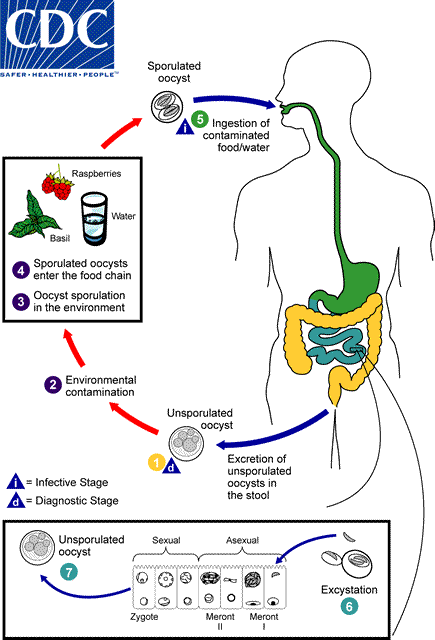
What is the Problem and What is Being Done About It?
FDA, CDC, state, and local partners are currently investigating several Cyclospora illnesses associated with McDonald’s locations in IA, IL, IN, KY, MN, MO, NE, OH, SD, and WI.
CDC has reported 286 laboratory-confirmed cases of cyclosporiasis in persons from CT, FL, IA, IL, IN, KY, MI, MN, MO, NE, OH, SD, TN, VA and WI who reportedly consumed salad products from several McDonald’s locations. The Florida case-patient purchased a salad while traveling in Kentucky and the Connecticut, Michigan, Tennessee, and Virginia case-patients purchased salads while traveling in Illinois.
On July 26, 2018, the FDA completed final analysis of an unused package of Fresh Express salad mix containing romaine lettuce and carrots, which had been distributed to McDonald’s. The analysis confirmed the presence of Cyclospora in that sample, though the expiration date for that product, July 19, had already passed. On July 27, the FDA informed Fresh Express of the results.
Fresh Express reported to FDA that the romaine from the same lot as the positive sample was not packaged for direct retail sale by Fresh Express and had already expired. Fresh Express committed to using recall procedures to inform those companies that received this romaine about the sample result.
On July 30, 2018, the U.S. Department of Agriculture’s Food Safety and Inspection Service (FSIS) issued a public health alert on beef, pork and poultry salad and wrap products potentially contaminated with Cyclospora that were distributed by Caito Foods LLC, of Indianapolis, Ind. The products were produced between July 15 to 18, 2018, with either “Best By,” “Enjoy by,” Best if Sold By” or “Sell By” dates ranging from July 18 through July 23, 2018. Caito Foods had received notification from Fresh Express that the chopped romaine in these products was being recalled.
Fresh Express reported that the carrots in the mix only went to McDonald’s.
McDonald’s reports that they stopped using the Fresh Express salad mix at impacted restaurants in IL, IA, IN, WI, MI, OH, MN, NE, SD, MT, ND, KY, WV, and MO on July 13, 2018. The company has since reported that it has replaced the supplier of salads in those states. More information can be found in McDonald’s Statement.
The investigation is ongoing and the FDA is currently reviewing distribution and supplier information for romaine and carrots.
Consumers who have symptoms of cyclosporiasis should contact their health care provider to report their symptoms and receive care. Most people infected with Cyclospora develop diarrhea, with frequent, sometimes explosive, bowel movements.
Other common symptoms include loss of appetite, weight loss, stomach cramps/pain, bloating, increased gas, nausea, and fatigue. Vomiting, body aches, headache, fever, and other flu-like symptoms may be noted. Some people who are infected with Cyclospora do not have any symptoms. If not treated, the illness may last from a few days to a month or longer. Symptoms may seem to go away and then return one or more times (relapse).
In 2015, FDA set up a multidisciplinary workgroup to prioritize the development, validation and implementation of a method for detecting Cyclospora in fresh produce. In 2018, FDA began using the newly validated Cyclospora method. The availability of this method is a significant advancement in FDA’s ability to investigate outbreaks of cyclosporiasis and identify the parasite in foods.
At this time, we do not have evidence to suggest that this cluster of illnesses is related to the ongoing Cyclospora outbreak linked to Del Monte vegetable trays.
What is Cyclospora?
Cyclospora cayetanensis is a microscopic parasite of humans. This parasite, when it contaminates food or water and is then ingested, can cause an intestinal illness called cyclosporiasis.
The Cyclospora parasite needs time (days to weeks) after being passed in a bowel movement to become infectious for another person. Therefore, it is unlikely that cyclosporiasis is passed directly from one person to another.
What are the Symptoms of Cyclosporiasis?
Most people infected with Cyclospora develop diarrhea, with frequent, sometimes explosive, bowel movements. Other common symptoms include loss of appetite, weight loss, stomach cramps/pain, bloating, increased gas, nausea, and fatigue. Vomiting, body aches, headache, fever, and other flu-like symptoms may be noted. Some people who are infected with Cyclospora do not have any symptoms. If not treated, the illness may last from a few days to a month or longer. Symptoms may seem to go away and then return one or more times (relapse).
Who is at Risk?
Anyone who consumed salads from McDonald’s in IA, IL, IN, KY, MN, MO, NE, OH, SD, and WI after May 20, 2018, could have been exposed to the pathogen. People can become infected with Cyclospora by consuming food or water contaminated with the parasite.
Also, at possible risk is anyone who consumed beef, pork and poultry salad and wrap products named in the July 30, 2018, public health alert issued by the U.S. Department of Agriculture’s Food Safety and Inspection Service (FSIS) after May 20, 2018.
What Do Restaurants and Retailers Need To Do?
- Retailers, restaurants, and other food service operators should always practice safe food handling and preparation measures. It is recommended that they wash hands, utensils, and surfaces with hot, soapy water before and after handling food. Wash and sanitize display cases and refrigerators where potentially contaminated products were stored.
- Wash and sanitize cutting boards, surfaces, and utensils used to prepare, serve, or store potentially contaminated products.
- Wash hands with hot water and soap following the cleaning and sanitation process.
- Regular frequent cleaning and sanitizing of food contact surfaces and utensils used in food preparation may help to minimize the likelihood of cross-contamination.
What Do Consumers Need To Do?
Consumers who have symptoms of cyclosporiasis should contact their health care provider to report their symptoms and receive care. Most people infected with Cyclospora develop diarrhea, with frequent, sometimes explosive, bowel movements. Other common symptoms include loss of appetite, weight loss, stomach cramps/pain, bloating, increased gas, nausea, and fatigue. Vomiting, body aches, headache, fever, and other flu-like symptoms (relapse).
Who Should be Contacted?
Contact your healthcare provider if you have diarrhea that lasts for more than three days. The FDA encourages consumers with questions about food safety to Submit An Inquiry, or to visit www.fda.gov/fcic for additional information.
People infected with the outbreak strains of Salmonella, by state of residence, as of July 30, 2018 (n=79)
Thursday, August 2nd, 2018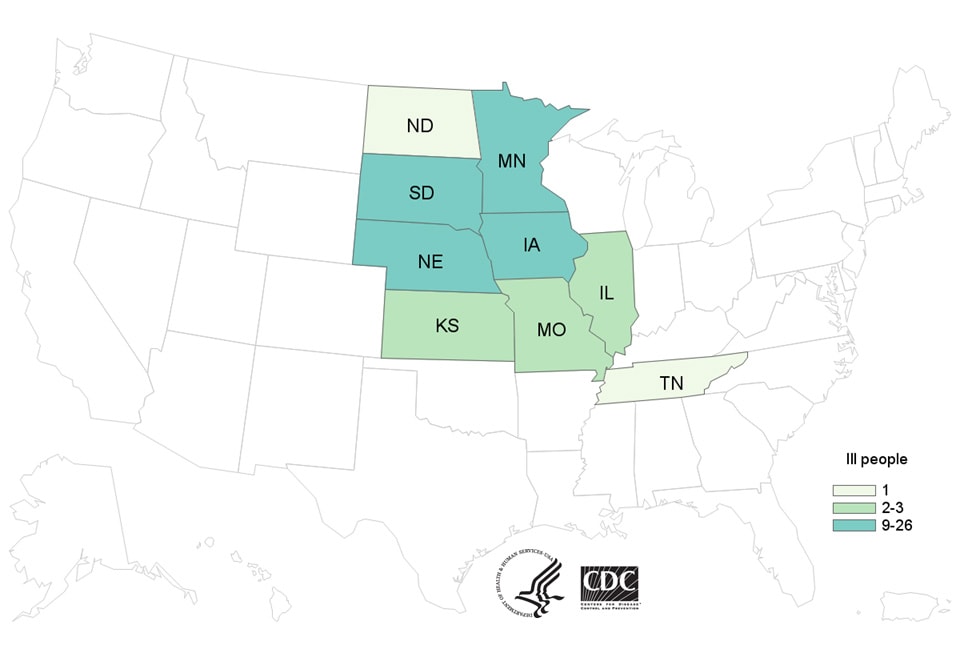
CDC, public health and regulatory officials in several states, and the U.S. Food and Drug Administration are investigating a multistate outbreak of Salmonella infections linked to Spring Pasta Salad purchased at Hy-Vee grocery stores.
Advice to Consumers, Restaurants, and Retailers

At A Glance
- Reported Cases: 79
- States: 9
- Hospitalizations: 18
- Deaths: 0
- Recall: Yes
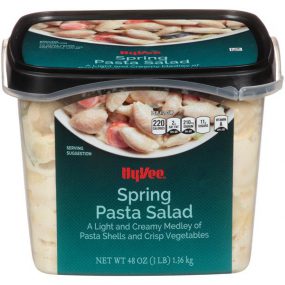
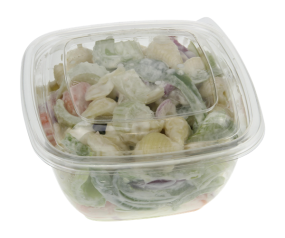
- On July 17, 2018, Hy-Vee, Inc. recalled its Spring Pasta Salad because it might be contaminated with Salmonella.
- Do not eat recalled Hy-Vee Spring Pasta Salad.
- The Spring Pasta Salad includes shell pasta, carrots, celery, cucumbers, green pepper, onion, and mayonnaise.
- The recalled pasta salad was sold in 1-pound (16 oz.) and 3-pound (48 oz.) plastic containers or may have been scooped at the deli counter into clear plastic containers.
- The recalled pasta salad was sold in all Hy-Vee grocery stores in Illinois, Iowa, Kansas, Minnesota, Missouri, Nebraska, South Dakota, and Wisconsin.
- The expiration dates for the recalled pasta salad range from June 22, 2018 to August 3, 2018.
- Return the recalled Spring Pasta Salad to the store for a refund or throw it away. Even if some of it was eaten and no one got sick, do not eat it.
- If you stored recalled pasta salad in another container, throw the pasta salad away. Thoroughly wash the container with warm, soapy water before using it again, to remove harmful germs that could contaminate other food.
- Contact a healthcare provider if you think you got sick from eating recalled Hy-Vee Spring Pasta Salad.
- Restaurants and retailers should not serve or sell recalled Hy-Vee Spring Pasta Salad.
Latest Outbreak Information

- Fifty-eight more ill people from nine states were added to this outbreak since the last update on July 18, 2018. Four more states reported ill people: Illinois, Kansas, North Dakota, and Tennessee.
- Salmonella enterica subspecies IIIb has been added to this investigation because two people were infected with this strain of Salmonella and with the outbreak strain of Salmonella Sandiego at the same time. A search of the CDC PulseNet database found six additional people infected with the strain of Salmonella enterica subspecies IIIb and these cases have also been added to the outbreak.
- A total of 79 people infected with the outbreak strains of Salmonella have been reported from nine states.
- Illnesses started on dates ranging from June 21, 2018, to July 15, 2018.
- Epidemiologic evidence indicates that Spring Pasta Salad purchased at Hy-Vee grocery stores is a likely source of the outbreak.
- This investigation is ongoing, and CDC will provide updates when more information is available.
Symptoms of Salmonella Infection

- Most people infected with Salmonella develop diarrhea, fever, and stomach cramps 12 to 72 hours after being exposed to the bacteria.
- The illness usually lasts 4 to 7 days, and most people recover without treatment.
- In some people, the diarrhea may be so severe that the patient needs to be hospitalized. Salmonella infection may spread from the intestines to the bloodstream and then to other places in the body.
- Children younger than 5 years, adults older than 65 years, and people with weakened immune systems are more likely to have a severe illness.
Investigation Details
August 1, 2018
Since the last update on July 18, 2018, 58 ill people have been added to this investigation. This includes six people who have been infected with a strain of Salmonella enterica subspecies IIIb, and two people infected with this strain and with the outbreak strain of Salmonella Sandiego at the same time.
As of July 30, 2018, 79 people infected with the outbreak strains of Salmonella Sandiego (71 people), Salmonella enterica subspecies IIIb (6 people), or both (2 people) have been reported from nine states. A list of the states and the number of cases in each can be found on the Map of Reported Cases page.
Illnesses started on dates ranging from June 21, 2018, to July 15, 2018. Ill people range in age from 1 year to 89, with a median age of 47. Among ill people, 67% are female. Out of 74 people with information available, 18 (24%) have been hospitalized. No deaths have been reported.
Illnesses that occurred after July 8, 2018, might not yet be reported due to the time it takes between when a person becomes ill and when the illness is reported. This takes an average of 2 to 4 weeks. Please see the Timeline for Reporting Cases of Salmonella Infection for more details.
State and local health officials continue to interview ill people and ask questions about the foods they ate and other exposures in the week before they became ill. Forty-seven (80%) of 59 people interviewed reported eating Spring Pasta Salad from Hy-Vee grocery stores in Iowa, Kansas, Minnesota, Nebraska, and South Dakota. The ill people in North Dakota and Tennessee traveled to states where Hy-Vee grocery stores are located.
This investigation is ongoing, and CDC will provide updates when more information is available.
Angiostrongylus cantonensis_ infection: Two case reports
Thursday, August 2nd, 2018Wang H, Lu L, She D, et al. Eating centipedes can result in
_Angiostrongylus cantonensis_ infection: Two case reports and pathogen
investigation. Am J Trop Med Hyg. 2018. doi: 10.4269/ajtmh.18-0151.
<https://doi.org/10.4269/ajtmh.18-0151>

Case One: “…..A 78-year-old woman was admitted to Zhujiang Hospital,Guangzhou,China,on November22,2012.She had been suffering from a moderate headache, somnolence, and cognitive impairment for several weeks, with no fever or vomiting. The patient said she had not sustained any recent trauma, been exposed to toxins, or consumed raw sea food or aquatic products. Physical examination revealed slight neck stiffness…… Further questions about the patient’s history showed that she had eaten centipedes without cooking them on several occasions……”
Case Two: “…..A 46-year-old male was admitted to Zhujiang Hospital in Guangzhou, China, on December 14, 2012. The patient’s main complaint was a mild headache that had lasted for more than 20 days. He experienced no seizures, changes in consciousness, paralysis, vomiting, or fever. The sole obvious focal neurologic sign was neck rigidity. He had also consumed raw centipedes….”
Video from inside the Aeromexico aircraft prior to its incredible crash with no lives lost.
Wednesday, August 1st, 2018Global warming & extreme weather disasters
Wednesday, August 1st, 2018Climate as Culprit : Document (NATURE | VOL 560 | 2 AUGUST 2018)
“……scientists had completed “attribution” studies on 190 extreme weather events between 2004 and the middle of 2018. In about two thirds of those cases, the researchers concluded the events had been made more likely, or more severe, because of humanity’s role in warming the Earth.
Last year, for the first time, studies suggested that three weather anomalies — a string of Asian heatwaves, record temperatures around much of the world and ocean warming in the Gulf of Alaska and Bering Sea — wouldn’t have happened were it not for climate change…….”
The Democratic Republic of Congo (DRC) health ministry announced that it has received reports of 25 fever cases with symptoms similar to Ebola in the eastern part of the country.
Wednesday, August 1st, 2018An investigative team from the General Directorate for the Fight Against Disease (DGLM) composed of three experts, including two epidemiologists and a biologist, will arrive in Beni as early as Tuesday, July 31, 2018 to support the provincial team.
The Ministry of Health instructed health professionals in the province to respect individual protection measures. In addition, the Ministry invites the population in the areas concerned to remain calm, vigilant and to respect the hygiene measures, in particular the regular washing of the hands.


